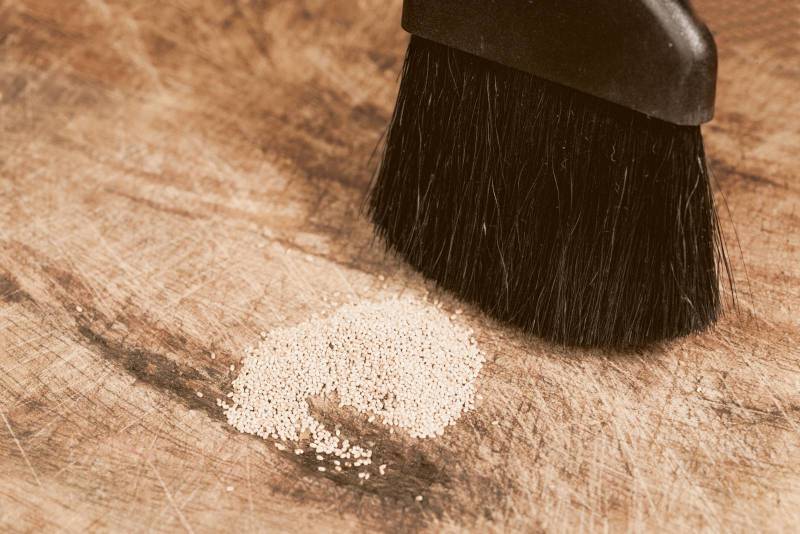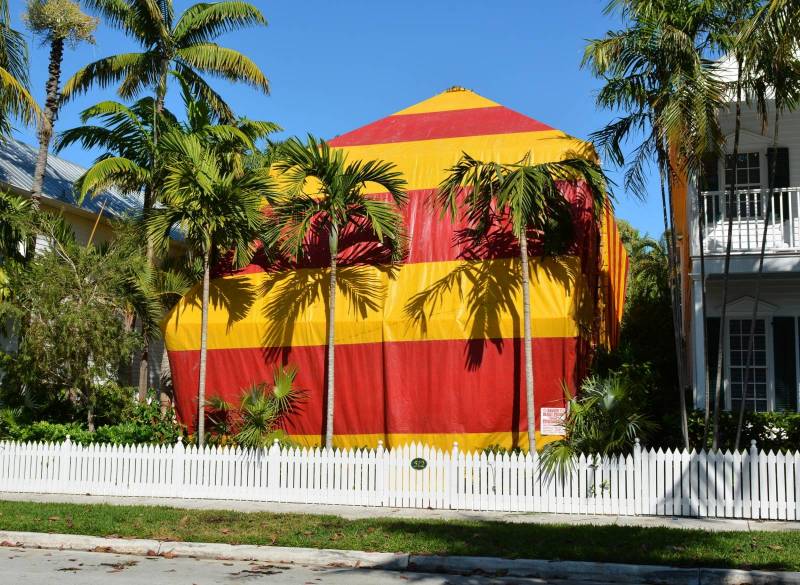Your house has termites! It is pretty common to have termites in Hawaii. Our family figured out recently that some of our kitchen cabinets had termites, so we went through tent fumigation over this past weekend. Not a lot of fun. However, almost every Hawaiian home will have termites at some time or another. You’ll notice it when the little piles of droppings, which often look like sand, start appearing near or beneath places where there is wood.

Termite droppings often look like sand but can be darker in color too.
The good news is that it is not usually a huge problem to see termites in your home. The important thing when you see termites is to have them treated as soon as possible. Some professionals recommend having your home tent fumigated for termites every 5-10 years. You can also spot treat small areas of dry wood termites, and avoid having tent fumigation, to keep termites under control.
Types of Termites in Hawaii
There are two general types of termites in Hawaii — dry wood termites and ground (or subterranean) termites. The ground termites do far more damage to Hawaii homes, far more quickly than dry wood termites. One can usually identify ground termites by the mud tunnels they create. If you see evidence of ground termites, you must act quickly. Ground termites can significantly damage or destroy a home. For a comprehensive comparison of the different types of termites in Hawaii and a study of termite infestations and how they occur, please see this Hawaii Homeowner’s Guide to Termites, by esteemed entomologist and Oahu termite inspector Jamie Neely.
Inspecting for Termites in Hawaii Home Purchases
When you purchase a Hawaii home, you should always consider the home’s history of termites, termite damage, and termite treatment in doing your due diligence. The Hawaii Association of Realtors’ standard Purchase Contract contains standard provisions regarding termite inspections and treatment.
Generally speaking, all homes will have to have a termite inspection prior to closing the sale. The buyer usually picks his or her own termite inspector, but the seller pays for the inspection. In many cases, the lender will require a termite inspection. Of course, as with almost any other term of the Purchase Contract, a buyer may waive his or her right to have a termite inspection. I would not recommend this, however, unless you are planning to tear down the home. Even homes and condos made from concrete and steel can have termites in their wood cabinetry, doors, baseboards, moldings, and other wood materials.
Frequently, buyers purchasing a home in Hawaii consider it good news to have the termite inspector discover an area or two with live dry wood termites. It sounds crazy, but if the inspector finds live termites during the inspection, the remedy is typically tent fumigation, with the cost borne by the seller. If the damage is significant, materially affecting the value of the home, the contract may also be rescinded. In most cases, however, the damage is minor and it is much easier to have the house tented before moving all of your belongings and your family into the home.

Tent fumigation for termites is usually recommended when live infestation is discovered in a Hawaii home for sale.
Tenting for Termites in Hawaii
So your house has termites and requires a tent. Better book in advance, as there is often a wait of several weeks or more. Once you book, you will have to prepare. The VIKANE gas used to kill termites can be lethal to living things and you must be careful to follow all instructions for tenting. Since your family will have to move out of your home for two or more days, you will need to stay with friends or family, take a trip, or book a local hotel. This might be a good time for a Hawaiian Staycation! We took a trip to Waikiki while our house was being tented.
Packing Up
Before you leave, you will have to pack up certain things in your home. Specifically, you must pack out or double-bag most food items in special airtight bags provided by the fumigation company. Medicines, pet food, and some personal care items must also be bagged or removed. The fumigation company will provide detailed instructions on what you can and cannot leave in your home.
Don’t Forget Pets & Plants
You must also remove all of your pets and plants from the premises. You should note that even some exterior plants may have to be removed if they are within a foot or so of your home. Otherwise, the fumigation company will put the tent over the plants, and they may not survive. Remember this when you are landscaping your yard. Not only can termites enter your home via plants that are too close to your foundation, but the plants may be killed during fumigation.
Other Items
You will also have to remove things other than plants that are near the outside foundation of your home. Examples are outdoor furniture, strand lighting attached to the house, and extensions on rain gutters. If you have natural or LP gas service, you may have to arrange for gas to be turned off for the tenting. On Oahu, the gas company will also have to turn it back on afterward. You will not want to be stuck without warm showers when you return home, so plan ahead.
In all, our home in Kailua, Oahu took about an eight hour day total for two of us to prep for the termite tenting. And then another day to put everything back. Hopefully, we will not see termites again for many years. If we do, there is a limited warranty on the tenting. It may be possible to spot treat (this is preferable) or re-fumigate by tent. Each termite fumigation company will have its own warranty and terms. Prices for tent fumigation may vary widely. Price will depend upon various factors, including the size and structure of your home. It is best to get several estimates for fumigation of termites in Hawaii. Be sure to compare not only the price, but the warranties as well.
Ongoing Prevention of Termites in Hawaii
After tenting for termites in Hawaii, you want to keep termites out of your house for as long as possible. These are some basic tips for prevention of termites in Hawaii:
- Use a regular professional termite inspection and monitoring service
- Consider professional prevention/detection products (e.g., Termidor or Sentricon), as recommended by professionals
- Use screens on your doors and windows so termites can’t fly in
- Keep raw wood surfaces painted and as dry as possible
- Keep downspouts and sprinkler spray away from the house
- Use treated or synthetic lumber when building, if possible
- Avoid earth to wood contact in your improvements
- Keep plants away from the foundation, siding, and roof of your home
Wishing you and your home many termite-free years!
Connect With Yvonne Jaramillo Ahearn, Esq. (B)
| TESTIMONIALS | BLOG | INSTAGRAM | FACEBOOK | LINKED IN | TWITTER |
![]()

Natasha Matt-Hensrud
March 10, 2019
Good article. New to termites and Hawaiian real estate . Considering buying a condo that has been treated for termites and wondering the risk and what we should do to secure ourselves against further damage down the road. Thanks- Natasha
V. Elaine
April 16, 2019
Great article. Very informative. Termites and island life go hand in hand. There is a tent fumigation preparation company now registered here called Vitalprep. They complete all pre- fumigation requirements and guarantee against cancellation.
Ashlee
November 28, 2021
This piece of writing will help the internet visitors
for creating new webpage or even a blog from start What to do when you see flying termites? end.